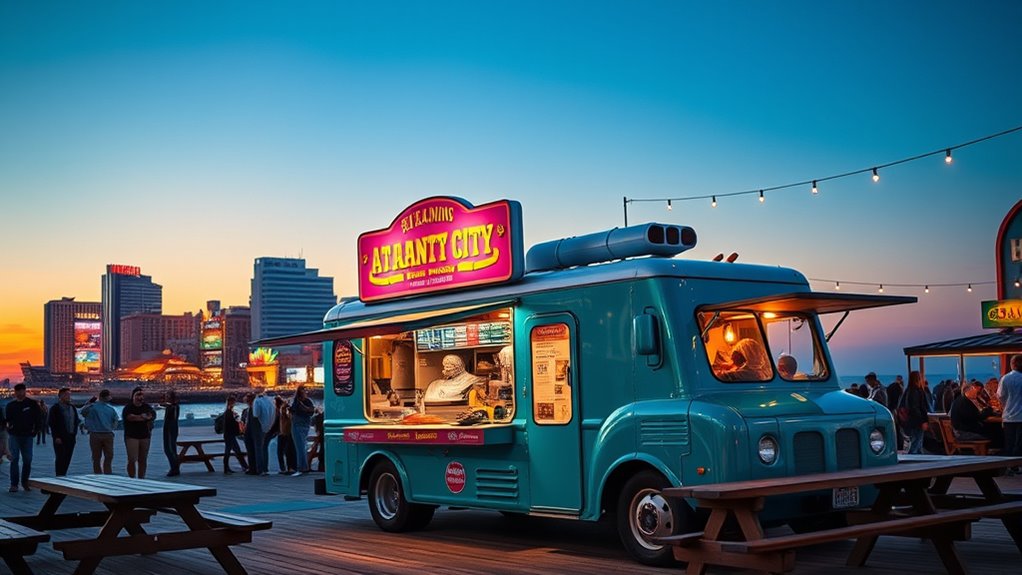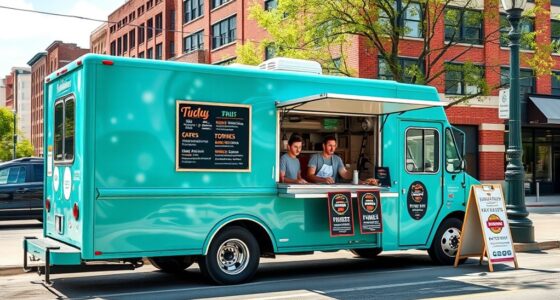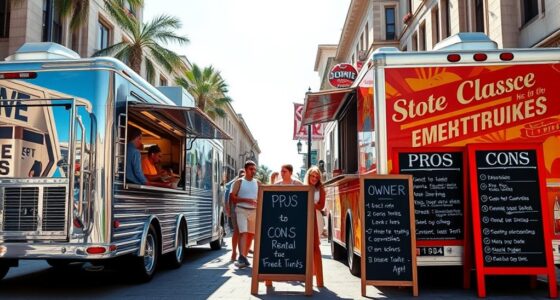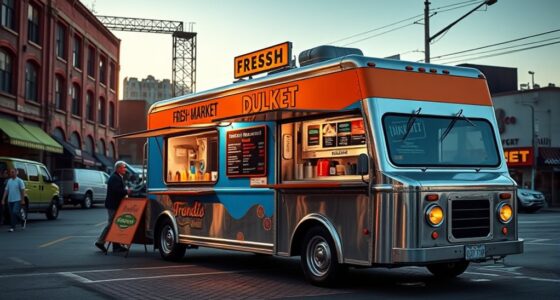To open a food truck in Atlantic City, you’ll need to secure local permits, health and fire safety inspections, and licensing from the NJ Division of Revenue. Costs typically range from $250 to $500 for permits and $5,000 to $8,000 for equipment, with ongoing expenses for fuel and supplies. Choose approved locations that meet zoning rules and develop a menu that’s tasty, safe, and compliant. If you keep exploring, you’ll find how to navigate regulations and build a successful business.
Key Takeaways
- Obtain necessary permits and licenses from Atlantic County and local authorities, including health, vending, and zoning permits.
- Budget approximately $250 for vending licenses, $150–$250 for business licenses, and operational costs of $5,000–$10,000 monthly.
- Choose high-traffic, approved locations like streets, parking lots, and event venues, ensuring compliance with municipal regulations.
- Develop a simple, safe menu focusing on regional flavors, allergen labeling, and quick-prep items suitable for limited space.
- Utilize social media, participate in local festivals, and implement loyalty programs to boost visibility and customer loyalty.
Navigating Permit Requirements and Licensing Processes

Navigating permit requirements and licensing processes is a crucial step to launching your food truck in Atlantic City. You’ll need to decide on your business structure, such as sole proprietorship, LLC, partnership, or corporation. If you choose an LLC or corporation, registering with the New Jersey Division of Revenue and Enterprise Services (DORES) is necessary, along with obtaining an EIN if you have staff or multiple owners. All business names must be registered locally or with DORES, depending on your entity type. You also need a vendor license for each city or town where you’ll operate; some places, like Newark, limit licenses or require bids for popular spots. Before starting, schedule health and safety inspections, secure zoning and parking permits, and verify compliance with local ordinances. Cote de Pablo’s portrayal of Ziva David on NCIS offers insight into how complex characters can evolve and resonate with audiences, emphasizing the importance of compelling storytelling in business branding.
Understanding Costs and Fee Structures for Food Truck Operations

Understanding the costs and fees involved in running a food truck is essential for your success. You’ll need to account for expenses like permits, insurance, supplies, and ongoing operational costs. Knowing these details helps you plan your budget and keep your business profitable. Additionally, considering the industry growth and potential revenue can help you make informed decisions about your investment and long-term sustainability. Being aware of regulatory requirements ensures compliance and avoids unexpected fines or delays.
Permitting Expenses Overview
Operating a food truck in Atlantic City involves several permit and licensing costs that you need to budget for upfront and ongoing. The main expenses include a $250 vending license, a business license ranging from $150 to $250, and local permits costing $200 to $500 depending on the area. Health inspection fees vary from $100 to $500 annually, with additional fire safety inspections costing $50 to $200 yearly. Keep in mind, renewal fees often match initial costs, and multiple trucks require separate permits. Fees also fluctuate by municipality and may include event-specific or temporary permits. Additionally, understanding the specific local regulations can help you avoid unexpected delays or fines, which is crucial for maintaining compliance. Below is a quick overview of typical costs:
| Permit Type | Cost Range | Frequency |
|---|---|---|
| Vending License | $250 | Annual |
| Health Inspection | $100 – $500 | Annually |
| Fire Safety Inspection | $50 – $200 | Annually |
Operational Cost Breakdown
Running a food truck in Atlantic City involves managing various costs that directly impact your profitability. You need to budget for monthly expenses like fuel, supplies, labor, and maintenance. Operating costs typically range from $5,000 to $10,000, with food and supplies accounting for about 25–35% of revenue. Fuel and transportation average $500 to $1,000 monthly, while equipment and power setup can cost $5,000 to $8,000 initially, plus ongoing utility expenses. Labor costs depend on staff size and wages, usually between $6,000 and $12,000 per month. Additionally, commissary rental, marketing, and inventory management are essential for smooth operations. Proper planning guarantees you’re prepared for the diverse financial demands of running a successful food truck. Considering the cost structures and fee breakdowns associated with food truck operations can help optimize your budget and ensure profitability.
Selecting Approved Locations and Navigating Operating Restrictions

Choosing the right location is essential for food truck success in Atlantic City, but you must first secure approval from local authorities. You need zoning and overnight parking permits, and locations must comply with municipal regulations, which vary by neighborhood and event. You should also consider community engagement to select spots that attract the most customers while respecting local residents and businesses. Approved spots include designated streets, parking lots, and public venues; operating outside these areas risks fines or shutdowns. For special events, you’ll need separate approval from the Atlantic County Division of Public Health and possibly local officials. You must sign location contracts before starting to ensure vending rights. Be aware of operating restrictions: limited hours, proximity to certain businesses, and overnight parking rules. Coordinating with event organizers and monitoring local ordinances helps you avoid violations and maximize your legal, profitable operating window. Understanding local laws and regulations is crucial to ensure compliance and avoid costly penalties.
Developing a Menu That Complies With Local Regulations and Attracts Customers

When developing your menu, you need to prioritize food safety standards while making sure everything complies with local regulations. Incorporate popular flavors and dietary options to attract a diverse crowd without risking violations. Balancing menu appeal with efficient preparation helps you stay within legal limits and keep operations smooth. Additionally, textile line knitting patterns can inspire creative presentation ideas, enhancing the visual appeal of your food truck offerings.
Menu Safety Standards
Developing a menu that complies with local food safety regulations is essential for attracting customers and ensuring smooth operations. You must prepare all food on-site; advance cooking elsewhere isn’t allowed. To prevent cross-contamination, separate cutting boards and prep areas are necessary for raw meats. Proper labeling of pre-packaged foods with ingredients and allergens is mandatory. Avoid menu items that require complex refrigeration or exceed your truck’s storage capacity to keep food at safe temperatures. Business registration and health permits are required to operate legally and ensure compliance with local standards. Ensure your team has the proper certifications, like a Food Protection Manager license, and follows hygiene standards. Regularly renew permits and training. Focus on simple, quickly prepared foods, avoid high-risk ingredients, and select ingredients that tolerate mobile service conditions. These steps keep your menu safe and compliant, building customer trust. Additionally, understanding the local food safety regulations can help you stay ahead of inspections and prevent costly violations.
Local Flavor Trends
Understanding local flavor preferences is key to crafting a menu that resonates with Atlantic City’s diverse visitors and residents. With its coastal location, seafood such as crab, clams, and local fish should feature prominently, appealing to both tourists and locals craving regional flavors. Classic boardwalk treats like saltwater taffy and funnel cakes continue to attract visitors, so including these can boost appeal. There’s also a growing demand for health-conscious options, including plant-based and allergen-free dishes, reflecting the city’s multicultural population. Incorporating ethnic and fusion cuisines—like Italian, Portuguese, or Asian-inspired dishes—can set your truck apart. Using seasonal, locally sourced ingredients supports freshness, sustainability, and appeals to consumers interested in regional flavors, helping your menu stand out in Atlantic City’s lively food scene.
Efficient Food Preparation
Creating a food truck menu that complies with local regulations while appealing to customers requires careful planning and efficient execution. To achieve this, focus on designing a menu with simple, compliant options that fit your space and meet safety standards.
- Use ingredients that can be prepped off-site or in permitted commissary kitchens to guarantee consistency and compliance.
- Incorporate multi-functional equipment to maximize space and streamline cooking processes.
- Choose menu items that share ingredients to simplify inventory and reduce waste.
- Prioritize dishes that require minimal on-truck cooking, lowering health inspection risks and speeding up service.
- Regularly review and update your menu to stay aligned with food safety regulations and ensure ongoing compliance.
Effective Marketing Strategies and Customer Engagement Tactics

To stand out in the competitive food truck scene in Atlantic City, leveraging effective marketing strategies and customer engagement tactics is essential. Social media is your most powerful tool—68% of food trucks use platforms like Facebook, which 75% favor. These campaigns boost sales by 20% for over half the trucks, and active engagement can increase customer spending by 15%. Participating in local festivals and community events, with 80% of trucks doing so, expands your reach and builds loyalty. Implementing loyalty programs results in 30% more repeat visits, especially when combined with social media. Using data analytics helps you understand customer preferences, optimize your marketing, and improve foot traffic. Data-driven decision-making is a crucial aspect that allows you to tailor your offerings and marketing efforts effectively. A strong visual brand and tailored menu offerings further attract and retain customers in Atlantic City’s vibrant food scene. Additionally, exploring eco-friendly marketing options, such as promoting sustainability initiatives or eco-conscious packaging, can appeal to environmentally aware consumers and differentiate your food truck in a crowded market.
Planning Your Business: Logistics, Compliance, and Operational Considerations

Launching a food truck in Atlantic City requires careful planning around logistics, compliance, and daily operations. You’ll need to verify your truck fits within the size restrictions—no more than 7 feet wide and 16 feet long—and is equipped with compliant commercial kitchen equipment. Regular maintenance, cleaning, and proper waste disposal per Atlantic County policies are essential to meet health standards. Additionally, understanding tableware standards and regulations can help ensure your serviceware meets local health and safety requirements.
- Secure necessary permits, including the Mobile Retail Food Establishment Application and event amendments
- Obtain Food Protection Manager certification from NJ-recognized organizations
- Coordinate with local authorities for vending locations and permits
- Budget for startup costs, licensing fees, waste disposal, and ongoing expenses
Staying compliant with health and environmental regulations ensures smooth operation and avoids costly penalties.
Frequently Asked Questions
How Long Does the Permit Approval Process Typically Take in Atlantic City?
You’re wondering how long the permit approval process takes in Atlantic City. Typically, it can take between 30 to 60 days after you complete your business registration and submit all necessary documents, including insurance and safety certifications. Keep in mind, delays can happen if paperwork isn’t complete or if multiple departments need to review your application. To stay on schedule, submit your application well in advance of your planned opening date.
Are There Any Specific Health Standards for Food Trucks in New Jersey?
So, you’re wondering if New Jersey has some secret health standards for food trucks? Well, surprise! They do. You’ll need permits, pass annual health inspections, keep raw meats separate, and label pre-packaged foods. Fire safety rules require extinguishers and propane checks. Plus, you’ve got to operate from an approved commissary, and your staff needs certified food protection training. Basically, follow these rules, and you’ll be golden—no magic involved.
Can I Operate a Food Truck Without a Physical Storefront in Atlantic County?
You can operate a food truck without a storefront in Atlantic County, but you need to follow specific regulations. You’ll have to submit a Mobile Retail Food Establishment Application and get approval before operating. Make sure your truck meets size restrictions, comply with fire and health requirements, and manage waste properly. Participating in events or vending at different locations requires advance permits, but as long as you meet these rules, you’re good to go.
What Types of Insurance Are Mandatory for Food Truck Businesses in New Jersey?
You need to carry several mandatory insurances for your food truck in New Jersey. These include general liability insurance to protect against injury or property damage claims, commercial auto insurance since your truck is a business vehicle, and workers’ compensation if you have employees. Additionally, product liability insurance covers food-related illnesses. Ensuring you meet these legal requirements helps protect your business and keeps you compliant with state regulations.
Are There Restrictions on the Types of Cuisine Allowed in Atlantic City Food Trucks?
You might wonder if Atlantic City restricts certain cuisines for food trucks. You’ll find no specific bans or limitations on cuisine types in local regulations or health codes. As long as your food complies with safety and sanitation standards, you’re free to serve any cuisine you choose. Just guarantee you follow all licensing, health, and operational requirements, which focus on food safety, not the style or ingredients of your menu.
Conclusion
Starting your food truck in Atlantic City might seem like a mountain, but with the right permits, choices, and marketing, you’ll turn it into a smooth ride. Stay organized, comply with all regulations, and craft a menu that excites. With dedication and smart planning, your food truck could become the hottest spot in town—drawing crowds like a magnet. Get ready to turn your dream into the most delicious reality Atlantic City has ever seen!









